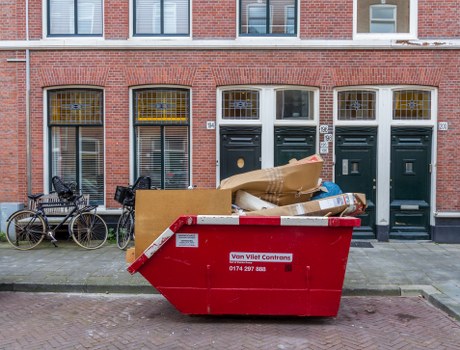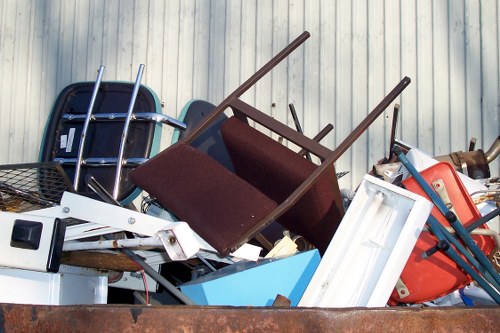Commercial Waste Disposal in House Clearances

When it comes to managing house clearances, commercial waste disposal plays a crucial role in ensuring that the process is smooth, efficient, and environmentally responsible. Whether you're clearing out a residential property for a property management company, real estate agency, or estate executor, understanding the nuances of commercial waste disposal is essential.
House clearances involve the removal of a wide range of items, from furniture and appliances to personal belongings and sometimes even hazardous materials. Proper disposal not only helps in maintaining environmental standards but also ensures compliance with local regulations.
In this comprehensive guide, we'll explore the various aspects of commercial waste disposal in house clearances, providing you with the knowledge needed to manage waste effectively and sustainably.
Why Proper Waste Disposal Matters in House Clearances

Effective waste disposal is a fundamental component of any house clearance operation. It ensures that unwanted items are handled responsibly, minimizing the environmental impact and promoting recycling and reuse wherever possible.
Improper disposal can lead to several issues, including legal consequences, increased costs, and harm to the environment. By implementing proper waste disposal practices, commercial entities can uphold their reputation, meet regulatory requirements, and contribute positively to sustainability efforts.
Moreover, efficient waste management can streamline the clearance process, making it quicker and more cost-effective. This benefits both the service providers and the clients, leading to higher satisfaction and better business outcomes.
Understanding House Clearances

House clearances involve the systematic removal of all personal belongings and fixtures from a property. This can occur for various reasons, including moving, estate management, rental turnovers, or property refurbishment.
For commercial operations, house clearances are typically handled by professional clearance companies that specialize in managing large volumes of items efficiently and respectfully. These companies must navigate logistical challenges, client expectations, and regulatory requirements to deliver successful outcomes.
Understanding the scope of house clearances is essential for effective waste disposal. It involves categorizing items, determining the most appropriate disposal methods, and coordinating with recycling centers, donation organizations, and landfill facilities as needed.
Types of Waste in House Clearances
General Household Items
During house clearances, a significant portion of the waste consists of general household items such as furniture, kitchen appliances, electronics, and textiles. These items can often be recycled or donated if they are still in usable condition.
Hazardous Materials
Some clearances may involve hazardous materials like paints, chemicals, batteries, or medical waste. These require special handling and disposal methods to ensure safety and compliance with environmental regulations.
Construction and Renovation Debris
In cases where the property is being renovated or repurposed, construction debris such as wood, metal, and plastic waste may be generated. Proper disposal of these materials is crucial to prevent environmental contamination and adhere to waste management guidelines.

Each type of waste presents unique challenges and opportunities for recycling or disposal. Identifying and categorizing the waste accurately helps in selecting the most effective disposal method.
Recycling not only reduces the environmental footprint but also can generate revenue if valuable materials are recovered and sold. Donations support community organizations and provide second-hand items to those in need.
For items that cannot be recycled or donated, responsible landfill disposal is the last resort, ensuring that waste is handled in an environmentally safe manner.
Regulations and Compliance
Local Waste Disposal Laws
Commercial waste disposal in house clearances must adhere to local and national waste disposal laws. These regulations dictate how different types of waste must be handled, stored, and transported.
Licensing and Permits
Businesses involved in waste disposal may need specific licenses and permits to operate legally. Compliance with these requirements is essential to avoid fines and legal complications.
Environmental Standards
Maintaining high environmental standards is not only a legal obligation but also a social responsibility. Proper waste disposal helps in reducing pollution, conserving resources, and promoting sustainable practices.

Upcoming Regulatory Changes
It's important for commercial entities to stay informed about upcoming changes in waste disposal regulations. Adapting to new laws proactively can ensure continued compliance and smooth operations.
Engaging with local authorities and industry associations can provide valuable insights and updates on regulatory developments.
Implementing compliance strategies early helps in mitigating risks and maintaining a good standing within the industry.
Methods of Waste Disposal
Recycling
Recycling involves processing waste materials to create new products, thereby conserving resources and reducing environmental impact. Commonly recycled items in house clearances include metals, plastics, glass, and paper products.
Donation
Donating usable items to charitable organizations or community groups can extend the life of the products and support those in need. This approach aligns with sustainable practices and social responsibility objectives.
Landfilling
For items that cannot be recycled or donated, landfill disposal is necessary. Ensuring that waste is transported to authorized landfill sites helps in minimizing environmental harm and adhering to legal requirements.

Innovative Disposal Techniques
Advancements in waste disposal technology have introduced innovative methods such as waste-to-energy processes and automated sorting systems. These techniques enhance efficiency and reduce the reliance on traditional disposal methods.
Embracing these innovations can provide commercial entities with a competitive edge and contribute to more sustainable waste management practices.
Investing in new technologies may involve upfront costs but can lead to long-term benefits in both operational efficiency and environmental impact.
Choosing a Commercial Waste Disposal Service
Assessing Service Providers
Selecting the right waste disposal service is critical for ensuring that house clearances are handled efficiently and responsibly. Factors to consider include the company's reputation, experience, range of services, and compliance with regulations.
Evaluating Sustainability Practices
Choose a service provider that prioritizes sustainability through practices such as recycling, donating, and minimizing landfill use. A commitment to environmental stewardship reflects positively on your business and aligns with broader sustainability goals.
Cost and Value
While cost is an important consideration, it's essential to balance affordability with the quality of service. A more expensive provider might offer better efficiency, compliance assurance, and sustainability practices, providing greater overall value.

Client Testimonials and Case Studies
Reviewing client testimonials and case studies can offer insights into a service provider's reliability and effectiveness. Success stories demonstrate the provider's capability to handle various clearance scenarios.
Engaging with past clients can provide firsthand accounts of the service quality and help in making an informed decision.
Transparency in operations and willingness to share experiences are indicators of a trustworthy service provider.
Best Practices for Efficient Waste Management
Planning and Organization
Effective waste management begins with meticulous planning and organization. Creating a detailed waste disposal plan helps in identifying the types of waste, appropriate disposal methods, and necessary resources.
Segregation of Waste
Segregating waste at the source facilitates easier recycling and disposal. Clear labeling and designated areas for different types of waste enhance the efficiency of the clearance process.
Training and Education
Providing training for staff involved in house clearances ensures that everyone understands the proper procedures for waste disposal. Education on best practices promotes consistency and compliance.

Utilizing Technology
Leveraging technology such as waste management software can streamline operations, track waste disposal activities, and ensure compliance with regulations.
Automation and data analysis enable more informed decision-making, leading to optimized waste management processes.
Investing in the right tools can significantly enhance the efficiency and effectiveness of commercial waste disposal efforts.
Environmental Impact of Waste Disposal
Reducing Carbon Footprint
Proper waste disposal significantly contributes to reducing the carbon footprint associated with house clearances. Recycling and reusing materials lower the demand for new resources, thereby conserving energy and reducing emissions.
Protecting Natural Resources
Efficient waste management safeguards natural resources by minimizing the extraction of raw materials and reducing habitat destruction caused by landfill expansions.
Promoting Sustainable Practices
Adopting sustainable waste disposal practices sets a positive example for the community and encourages other businesses to follow suit, fostering a culture of environmental responsibility.

Long-Term Environmental Benefits
Investing in responsible waste disposal has long-term benefits, including cleaner air and water, healthier ecosystems, and a more sustainable environment for future generations.
These benefits align with global sustainability goals and contribute to a healthier planet.
By prioritizing environmental impact, commercial entities can play a vital role in combating climate change and preserving natural habitats.
Cost Considerations and Budgeting
Pricing Structures
Understanding the pricing structures of waste disposal services is essential for accurate budgeting. Costs may vary based on the volume of waste, types of materials, and specific services required.
Hidden Costs
Be aware of potential hidden costs such as transportation fees, recycling charges, or disposal taxes. Clear communication with service providers can help in identifying and mitigating these additional expenses.
Maximizing Value
Maximizing value involves selecting services that offer the best combination of cost, efficiency, and sustainability. Investing in high-quality waste disposal can lead to long-term savings through improved operational efficiency and reduced environmental impact.

Budgeting Tips
- Conduct a waste audit to understand the volume and types of waste generated.
- Set clear waste disposal goals aligned with your budget and sustainability objectives.
- Negotiate pricing and service terms with multiple providers to secure the best deal.
- Implement waste reduction strategies to minimize the amount of waste requiring disposal.
Conclusion

Effective commercial waste disposal in house clearances is a multifaceted process that requires careful planning, adherence to regulations, and a commitment to sustainability. By understanding the types of waste, selecting the right disposal methods, and choosing a reliable service provider, businesses can manage waste efficiently and responsibly.
Implementing best practices not only ensures compliance and cost-effectiveness but also contributes to environmental preservation and social responsibility.
Embrace sustainable waste management strategies today to enhance your house clearance operations and make a positive impact on the world.
Contact us today to learn more about how our expert commercial waste disposal services can support your house clearance needs.